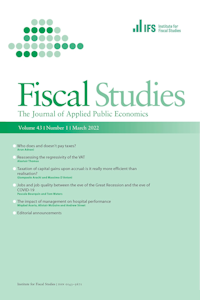
Adams-Prassl, A., Boneva, T., Golin, M. and Rauh, C.
Furloughing
Fiscal Studies Special Issue: The COVID‐19 Economic Crisis
Vol. 41 no. 3 pp. 591-622 (2020)
Abstract: Over nine million jobs were furloughed in the United Kingdom during the coronavirus pandemic. Using real-time survey evidence from the UK in April and May 2020, we document which workers were most likely to be furloughed and we analyse variation in the terms on which they furloughed. We find that women were significantly more likely to be furloughed. Inequality in care responsibilities seems to have played a key role: mothers were 10 percentage points more likely than fathers to initiate the decision to be furloughed (as opposed to it being fully or mostly the employer's decision) but we find no such gender gap amongst childless workers. The prohibition of working whilst furloughed was routinely ignored, especially by men who can do a large percentage of their work tasks from home. Women were less likely to have their salary topped up beyond the 80 per cent subsidy paid for by the government. Considering the future, furloughed workers without employer-provided sick pay have a lower willingness to pay to return to work, as do those in sales and food preparation occupations. Compared with non-furloughed employees, furloughed workers are more pessimistic about keeping their job in the short to medium run and are more likely to be actively searching for a new job, even when controlling for detailed job characteristics. These results have important implications for the design of short-time work schemes and the strategy for effectively reopening the economy.
Keywords: COVID-19, coronavirus, crisis, recession, short-time work, furlough, inequality
JEL Codes: J21, J22, J24, J33, J63
Author links: Christopher Rauh
Publisher's Link: https://doi.org/10.1111/1475-5890.12242 ![]()
Keynes Fund Project(s):
The Impact of Automation and Fears of Job Displacement on Political Preferences (JHUQ)
Cambridge-INET Working Paper Version of Paper: Furloughing, Adams-Prassl, A., Boneva, T., Golin, M. and Rauh, C., (2020)
